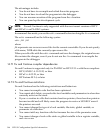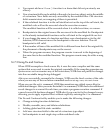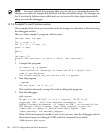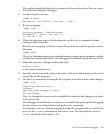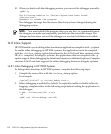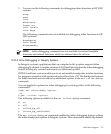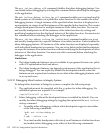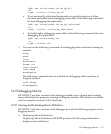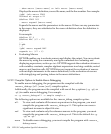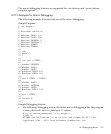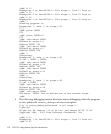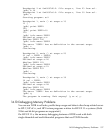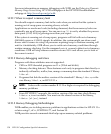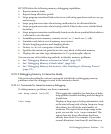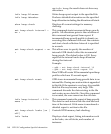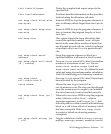- show macro [macro-name] or info macro [macro-name]
Displays the macro definition, source file name, and the line number. For example:
(gdb) info macro VAR2
Defined at scope.c:21
#define VAR2 201
- macro expand [macro-name]
Expands the macro and the parameters in the macro. If there are any parameters
in the macro, they are substituted in the macro definition when the definition is
displayed.
For example:
#define YY 6
#define MAC (67 + YY)
...
$ gdb
...
(gdb) macro expand MAC
expands to: (67 + 6)
• Evaluating Macros
HP WDB enables you to evaluate a macro and display the output. You can evaluate
the macro by using the commonly used gdb commands for evaluating and
displaying expressions, such as print. HP WDB supports the evaluation of macros
with variables, constants, complex algebraic expressions involving variables, nested
macros, and function calls. HP WDB does not support the evaluation of macros
with multiple statements in the macro definitions, or the evaluation of macros
with stringifying and pasting tokens in the macro definitions.
14.9.1.1 Compiler Options to Enable Macro Debugging
To enable macro debugging, the program must be compiled with the
+macro_debug=[all|none|ref] compiler option.
Additionally, the program must be compiled with one of the -g options (-g, -g0, or
-g1) to enable macro debugging. For example:
cc -g +macro_debug=all -o sample sample.c
The following options are available for the +macro_debug compiler option:
all
To view and evaluate all the macro expressions in the program, you must
compile the program with +macro_debug=all. This option can cause a
significant increase in object file size.
ref
To view and evaluate only the reference macros in the program, you must
compile the program with +macro_debug=ref. This is the default for -g,
-g0, or -g1.
none To disable macro debugging, you must compile the program with +macro_
debug=none
154 HP-UX Configuration-Specific Information



